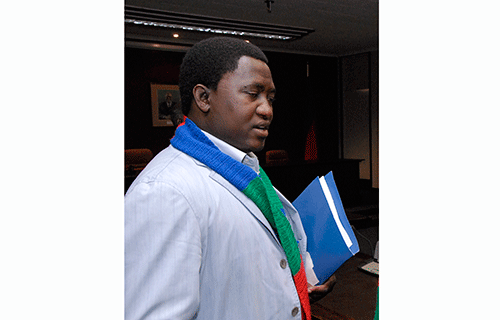EENHANA – Swapo secretary general hopeful Armas Amukwiyu this week admitted receiving funds linked to the Fishrot corruption scandal, but maintained his innocence in the saga.
Almost three years after the wide-reaching corruption scandal exploded into the headlines and front pages worldwide, the ruling party continues to wrestle allegations of its involvement in the matter which resulted in the arrest of two Cabinet ministers and allegations that Swapo and some cadres benefitted unduly from the scam.
The scandal revolves around the payment of bribes from an Icelandic fishing company, Samherji, to government officials in exchange for Namibian fishing rights. In 2020, a senior investigator at the Anti-Corruption Commission (ACC) in the bail application of former fisheries minister Bernhard Esau and his son-in-law Tamson Hatuikulipi said investigations have shown that Fishrot money bankrolled the Swapo internal election campaign in 2017 after whistleblower Jóhannes Stefánsson and an Al Jazeera investigation implicated Esau and then justice minister Sacky Shanghala in the scandal.
Some of the party members who were implicated include Swapo’s Oshikoto coordinator, Amukwiyu, who was allegedly a key beneficiary in the scandal.
During the internal campaign event in Eenhana this week, Amukwiyu denied any wrongdoing, saying he is a State witness and not an accused in the matter.
“Any comrade who accuses another comrade of corruption with the intention to influence the delegates’ decision is as well corrupt,” Amukwiyu retorted.
He admitted to having received money when he was the chairperson of the party’s regional coordinators’ forum, which he said came as a mere donation from party sympathisers, and he was not aware of its linkage to corrupt dealings.
He added that the money was used for Swapo-related functions, and not for personal gain. During the same campaign, a congress delegate said the scandal has damaged the image of the party, and wanted Prime Minister and vice presidential candidate Saara Kuugongelwa-Amadhila to explain what strategy she would employ to change the corruption-tainted image.
In her response, Kuugongelwa-Amadhila said during those campaigns, there was no policy or a system in place that could have filtered donations from illicit dealings.
“At the time that Fishrot took place and some donations were said to have been given to individuals for party activities, there was no policy, hence that is now being used to accuse Swapo of being a beneficiary of Fishrot,” she stated. Having learned the hard way, Kuugongelwa-Amadhila said now the party has established a structure, and it has systems in place that filter donations made to the party. “Whoever will want to make donations to the party, we will show them our policies, do the auditing, and reject the offer if that money is illegal,” she said.
“It is the same thing that we do even in government. But yes, we have to fight the issue of corruption, and it is as important that we are seen not corrupt as it is for us not to be corrupt because perception is very important.”
In 2020, Swapo President Hage Geingob said the ruling party’s financial books are open for scrutiny, and anyone is welcome to review them.
“We can give you audited Swapo reports and financial reports, and you will not see any money coming from Fishrot. If names of people were mentioned and they are in court proceedings, we are not going to defend, influence and interfere in those proceedings,” Geingob reacted to the allegations.
He said until 17 November 2019, the Electoral Commission of Namibia (ECN) regulations required under the ECN Act to fix a maximum donation threshold, were non-existent.
“Consequently, political parties that may have received donations between 2014 to 17 November 2019 would not have been under statutory obligation to publicly disclose donations as the prescribed donation amount beyond which donations must be publicly disclosed, did not exist at the time. Resultantly, both recipients of political donations, and donors, were under no obligation, until 18 November 2019, to make public disclosure of donations beyond the fixed threshold amount,” he explained.
This applies across the whole political spectrum, including donations, foreign or local, made to other political parties and independent candidates.
On 18 November 2019, it became law that the total donations that political parties may receive from a Namibian person or a local institution should not exceed N$4 million per financial year, while a total sum of donations received from foreign persons or foreign institutions should not exceed N$2 million for a particular year.
Come end of November, the party will have its seventh elective congress that will determine its future for the next five years.
The congress will see incumbent vice president Netumbo Nandi-Ndaitwah contesting the vice presidency against Kuugongelwa-Amadhila and environment minister Pohamba Shifeta.
Sophia Shaningwa will square off against Amukwiyu for the SG position.
Former Cabinet minister Uahekua Herunga, parliamentarians Lucia Witbooi, Evelyn !Nawases-Taeyele and Kavango West party coordinator David Hamutenya are contesting the deputy SG position.



